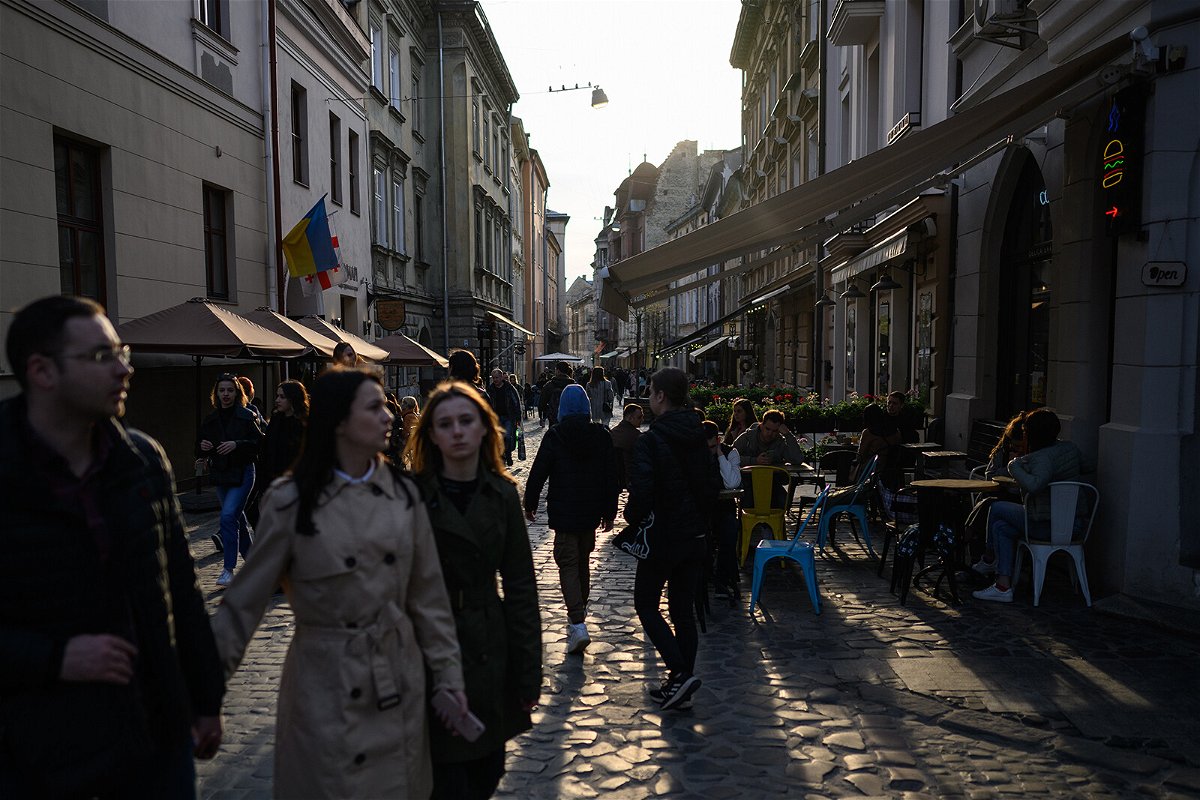Dispatch from Ukraine: Here’s what CNN is seeing on the ground in Lviv

People wander the cobbled streets on April 30
By Paul LeBlanc, CNN
The moment CNN’s Sara Sidner arrived in Lviv, Ukraine this weekend, an air raid siren was going off — an alert, she tweeted, that gives “a heightened sense of what it is to be alive and the possibility of random death.”
For a better understanding of the environment on the ground, we asked Sara about what she observed in Lviv and how locals are reacting more than two months into the war. Here’s what she told us via email:
On the environment in Lviv. War happens in pockets, not all over the place all at once. In Lviv (there’s) an odd combination of awareness — war can appear at any time and (it’s still) complete calm.
In the stretches between the air raid sirens, which usually do not result in an actual missile strike in Lviv, people are going about their lives as normally as they can.
On how locals are behaving. The sirens go off, some pedestrians we see walking in the street then look up and then continue on unfazed; some shuffle quickly inside buildings they didn’t intend to enter
There is no panic, just pragmatic steps to find some sense of safety just in case.
On the contrast of war and family life. Signs of war greet you when you come into the city. Check points complete with soldiers with their guns slung across their chest and makeshift barriers.
At a local park, families play with young kids and dogs roam around. But nearby on a grassy knoll in the park, there are a couple of sets of stairs seemingly going straight down into the earth. Those stairs lead to old bunkers fortified with concrete.
When the sirens wail some families shuffle closer to the bunkers. No one seems to enter.
What else?
House Speaker Nancy Pelosi became the most senior US official to meet with Ukrainian President Volodymyr Zelensky this weekend with her unannounced trip to Kyiv.
Pelosi’s office said Sunday that the speaker had led an official congressional delegation to Ukraine — the first since the Russian invasion of the country began on February 24.
Zelensky shared a video Sunday of his meeting with the delegation and thanked the US for its support of Ukraine against Russian aggression.
In the clip, Pelosi is seen telling Zelensky, “We are visiting you to say thank you for your fight for freedom, that we’re on a frontier of freedom and that your fight is a fight for everyone. And so our commitment is to be there for you until the fight is done.”
But the visit comes as Russia’s brutal war enters a new phase, with no end in sight. Here’s the latest:
Civilian evacuation route paused. The evacuation of civilians from the besieged southern Ukrainian city of Mariupol has been paused until Monday, the Mariupol City Council announced Sunday, citing “security reasons.”
The city council said in a Telegram post that the evacuation would recommence at 8 a.m. local time near a shopping center in Mariupol. The announcement came hours after Zelensky had announced that the evacuation of civilians from the besieged Azovstal steel plant in Mariupol was underway.
Zelensky said later Sunday that, for the first time, the vital corridor to evacuate civilians from the plant had started working, adding that more than 100 civilians had been evacuated. But the complex came under fire again Sunday night, according to a Ukrainian soldier in Mariupol who spoke to Ukrainian television.
Thousands of war crimes being investigated. The prosecutor general of Ukraine said her office is opening new cases of alleged war crimes by Russian forces, with a total of 9,158 criminal cases “involving purely war crimes.”
Prosecutor Iryna Venediktova said on Ukrainian television: “We have already identified specific war criminals,” adding, “There are 15 people in the Kyiv region, for instance; 10 of them in Bucha. We are holding them accountable for torture, rape and looting.”
Ukrainian prosecutors named 10 Russian soldiers last week as being suspected of a variety of crimes in Bucha.
Ready for the long game. Last week, responding to pleas from Zelensky, a group of 40 nations gathered by the US in Germany agreed to streamline and expedite the delivery of weapons to Ukraine.
“We’ve got to move at the speed of war,” said Defense Secretary Lloyd Austin, who met with Zelensky in Kyiv last week along with Secretary of State Antony Blinken.
The US House of Representatives on Thursday passed legislation that would allow Biden to use a World War II-era law, known as the Lend-Lease Act of 1941, to swiftly supply weapons to Ukraine on loan. That law was originally created to help forces fighting Nazi Germany and reflects the urgency in Congress to support the Ukrainian armed forces.
President Joe Biden also asked Congress for a $33 billion supplemental funding bill to aid Ukraine over the next several months.
The President separately outlined a proposal that would further pressure Russian oligarchs over the war in Ukraine, including using money from their seized assets to fund Ukraine’s defense.
The-CNN-Wire
™ & © 2022 Cable News Network, Inc., a WarnerMedia Company. All rights reserved.
